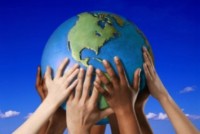A Global Identity
Posted OnSeptember 24, 2015 by
By Anjali Mishra.
In Ancient Greece and Rome, a citizen was someone who not only belonged to a specific area, but was also someone who played a role in advancing society. It was someone who made life better. This theory of citizenship developed and as interaction between different cultures and countries increases, several Ancient Greeks and Romans began to call themselves citizens of the world- or global citizens. Despite this being an ancient concept, I only heard about it two months ago and was instantly convinced that I need to be one.
But what exactly is a global citizen? Yeah sure the ancient Greeks and Romans used it, but how is it relevant today? Is it even relevant?
The answer is a resounding yes! More than ever now, increased globalization and interconnectedness of the world has allowed cultures, countries, and traditions from all over the world to be available to everyone. A global citizen is someone who identifies with being part of an emerging global community and whose actions contribute to the bettering of that community’s values and practices. With that being said, it does not mean that being a global citizen means abandoning ones own identity, such as patriotism for our countries, ethnicities, and other beliefs. Those ideals provide us with our identity and give meaning to our lives. However, being a global citizen adds an extra layer of responsibility associated with being a part of globalized world.
The one thing that unites all human beings is hardship. The struggle associated with it is something that is inherent to all people. For the past hundreds of years, issues such as human rights, gender inequality, environmental degradation, poverty, hunger, etc. have all been issues that have existed but silenced by those in power. International organizations, sovereign states, transnational corporations, NGOS, and other bodies have been making efforts to mitigate the negative impacts of issues that are prevalent all over the globe. However, it is time for individual citizens to begin creating change and get involved in the global community.
Being a member of a global community means one is transcending all state borders and becoming more socially, politically, and economically integrated with the world. Essentially there are three main facets of being a global citizen.
- First is awareness. An individual should have someone conscious knowledge of global events, culture, and faiths. Grasping the connection between action, knowledge, and advocacy while understanding international institutions and foreign ideologies contribute to increasing one’s knowledge of the global world.
- Second is having a sense of responsibility for bettering the world. Like what the Ancient Greeks and Romans, merely being a citizen should not be enough, but rather one should be willing to advance society and make life better.
- The last aspect of being a global citizen is participation. No matter how small the change is, it all matters. It can be anything from empathizing with others to fighting against global challenges.
There are no set restrictions or requirements for being a global citizen. Anyone who is willing to understand the different cultures and hardships of the world qualifies as a global citizen. Staying up to date on current issues is a great way of understanding all global issues and realizing the struggle that every human endures. Being a global citizen entails proving inclusivity, trust, and compassion to every human in the global community.
Photo credit: www.ei-ie.org
